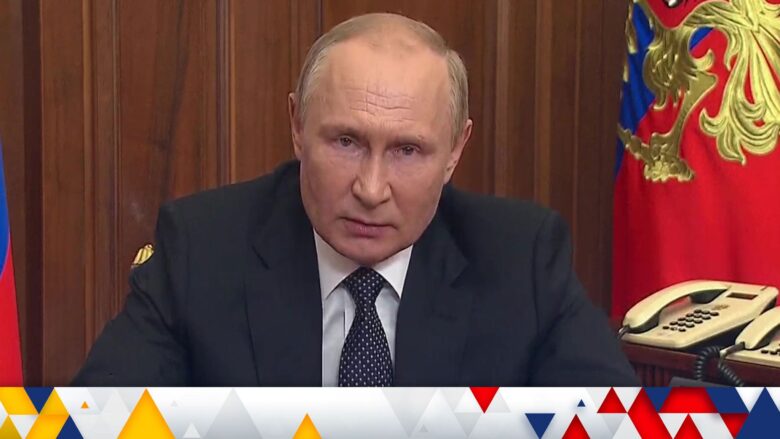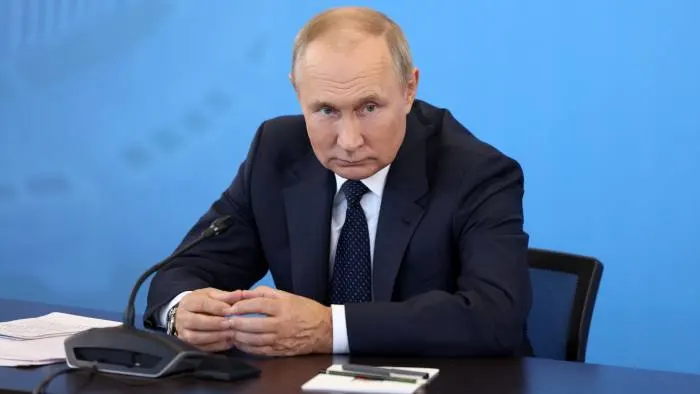On September 21, Russian President Vladimir Putin issued a mobilization order to send his people to the battlefields of Ukraine. Whether this will help him to recover from his poor performance, it is highly likely that he will “dig his own grave. In Europe and the United States, there is active discussion about what will happen after Putin’s ouster. What will happen to Russia?
Putin’s Regime Seemingly in Turmoil

Defense Minister Sergei Shoigu initially said that “300,000 people will be called up in stages,” but the mobilization order issued by the presidential administration later failed to clarify the crucial scale of the mobilization, and there has been a succession of reports that “the actual number will be 1 million,” or even “1.2 million.
The method of mobilization was also wild, with detained protestors being summoned on the spot, and “the village head went from house to house and handed the summons to the man in charge of the village. In one village, “3,000 people were summoned within 24 hours of the president’s announcement.
Near the Russian border, cars lined up to flee the country, and the New York Times reported on the 29th that “at least 200,000 people have already fled.
Can we really fight with this kind of mobilization? It would be impossible. It is hard to believe that the mobilized people are “prepared to die for Russia. On the contrary, I think they will try to revolt or flee.
Some say that the authorities know this, so they will not give them weapons, but simply send them to the front lines unarmed as decoys. The Ukrainian military will see right through it. Even if they are not sent to the battlefield and replaced with border guards, it will only make it easier for them to flee the country.
The 300,000 Ukrainian troops are double the number of the Russian army, which was said to number 150,000 at the time of the invasion. Since the depleted force is said to be several tens of thousands, sending all 300,000 to the battlefield would mean that the Russian army would have a “rebel reserve” several times the size of its original force. If this were to happen, commanders would be too anxious to fight. They would not know when they would be betrayed in their sleep.
In the end, the mobilization order only stirred up defiance against Putin’s regime and had the opposite effect. Nevertheless, they decided to mobilize because, as I wrote in last week’s column, China has virtually abandoned them, and they are so cornered that they are asking North Korea to provide arms and ammunition.
In a word, the mobilization decree is likely to be the “beginning of the end” of Putin’s war.
Collapse Patterns of Dictatorships
In the face of this situation, the debate over “Russia after Putin’s fall” has been raging in the West, with the Washington Post on the 27th publishing an analysis by a Stanford University expert titled “Is Putin Vulnerable or Could Russia’s Dictatorship Turn into Another Dictatorship?
According to the article, there are three patterns in the collapse of dictatorships.
The first is when a dictatorship is reborn as a democracy; the second is when the dictator is overthrown by his entourage and a new dictatorship begins; the third is when a new group overthrows the dictator and his entourage and a new form of dictatorship begins.
A group led by Professor Emerita Barbara Guedes of the University of California examined 280 dictatorships that existed from 1946 to 2010 to see what kind of regime change had occurred. They found that 75% of them corresponded to the second or third case above, and that “less than 25%” were democratized.
In the majority of cases, when a dictator fell, the remaining members of his inner circle continued to rule, or another group established a new dictatorship. Whether or not this applies to Putin’s Russia is not clear, but historical experience suggests that we should not expect that Russia will become democratic once Putin falls.
There are also warnings against such optimism and expectations.
On September 27, Harvard University Professor Stephen Walt, whom I have mentioned many times in this column, wrote an article titled “Russia’s Defeat Would Be a Conundrum for the United States” in Foreign Policy magazine, warning against excessive U.S. expectations as follows.
———-
〈Winning in Ukraine does not mean that the U.S. can remake the world to its liking. Such a goal was far-fetched even during US unipolar rule. The overall situation is far worse, given the rise of China, the economic weakness of Europe, and the love-hate attitude of developing countries toward the United States. If U.S. policy makers take the Ukraine victory as “an opportunity for a global pro-liberal movement,” they will fail again!
———-
The U.S. has failed spectacularly in its attempt to remake Afghanistan into a country to U.S. liking. The professor implicitly warns, in the wake of the Ukraine victory, that “if you expect too much, or intervene too much, to turn Russia into a U.S.-favored democracy, you will fail spectacularly.
Who will be next in power?
If Putin’s regime collapses, who will be next in power?
An earlier Washington Post article listed three names as possible replacements for Vladimir Putin. Nikolai Patrushev, secretary of Russia’s Federal Security Council; Sergei Naryshkin, head of Russia’s Foreign Intelligence Service; and Aleksandr Bortnikov, head of Russia’s Federal Security Service (FSB).
The three men will form a temporary “military junta” to continue the dictatorship. However, since none of the three has the personal authority of Vladimir Putin, the report also points out the possibility that “Sergei Sobyanin, the mayor of Moscow, will take his place” as the ostensible ruler.
As for Sobyanin, another journalist also mentioned him on the Carnegie Endowment for International Peace website as one of the leading candidates, along with Russian Prime Minister Mikhail Mishustin. He is a reporter for Meduza, an independent news site based in Riga, Latvia, that specializes in Russian opposition to the war.
We will be keeping a close eye on Medusa in the future.
There is another possibility. In an article titled “Europe Is Trying Hard to Figure Out What Happens Next to Russia,” Foreign Policy mentioned the name of Evgeny Prigozhin, the owner of a new Russian conglomerate and also known as “Putin’s Chef.
Prigozhin is notable because he recently admitted to being the founder of the Wagner Group, a Russian private military company fighting in Ukraine. Foreign Policy wrote, “Wagner is proving to be the only fighting force now on the battlefield. He will use it politically,” it noted.
If there is a political upheaval in Russia, not only political gamesmanship, but ultimately, military power could become a factor. Needless to say, having an elite force on its own that can be moved at the tip of a finger would be a formidable weapon. An army is a force.
We do not know, of course, what will actually happen. But it is now certain that the objective situation has begun to change “after Putin’s ouster.


コメント